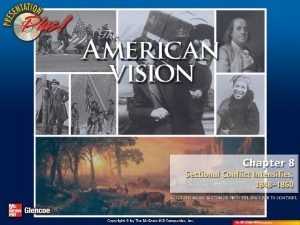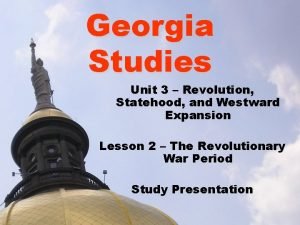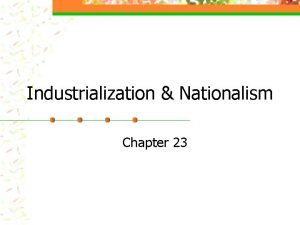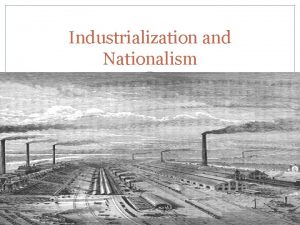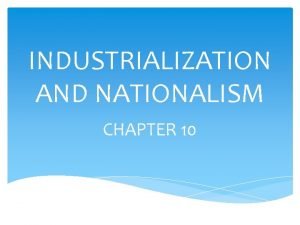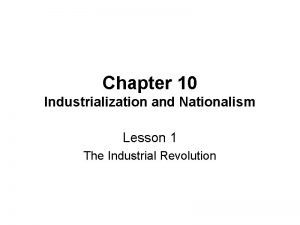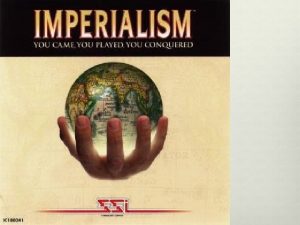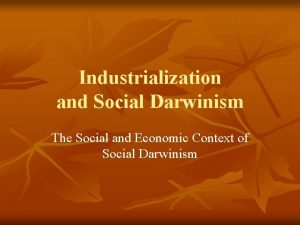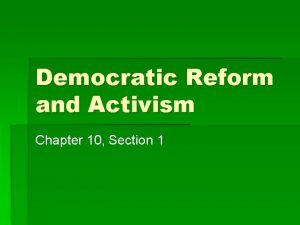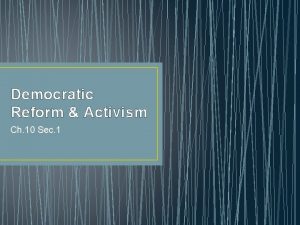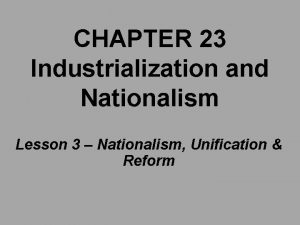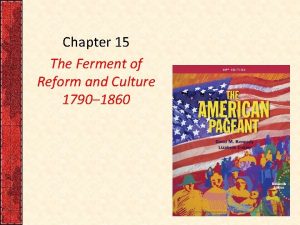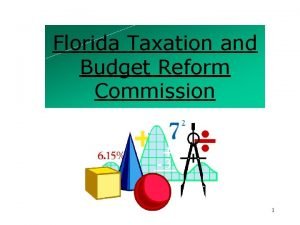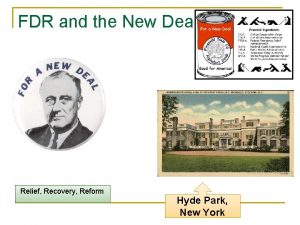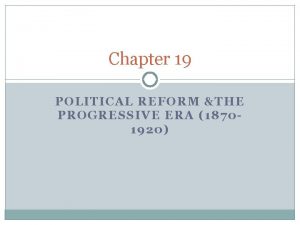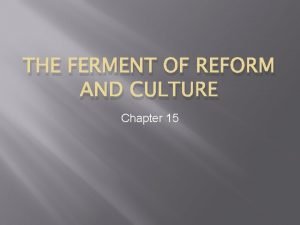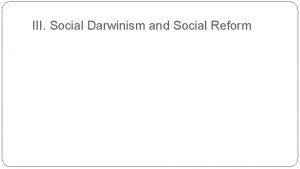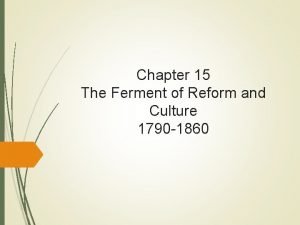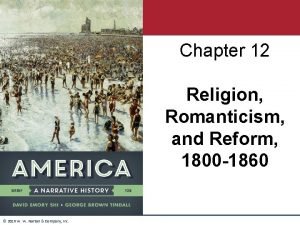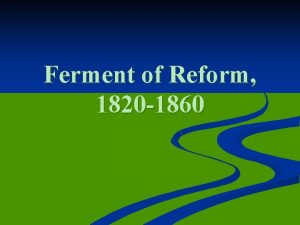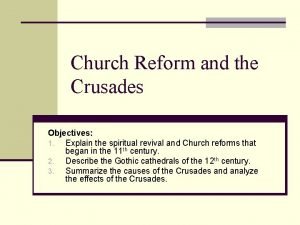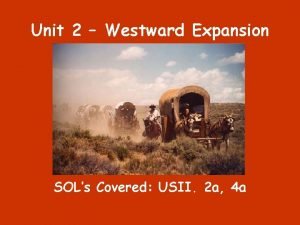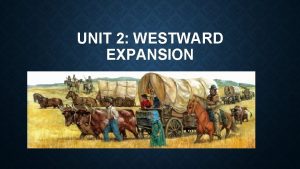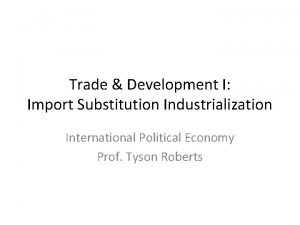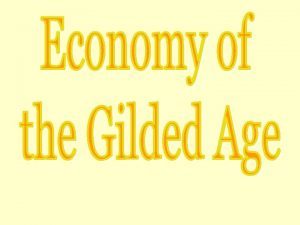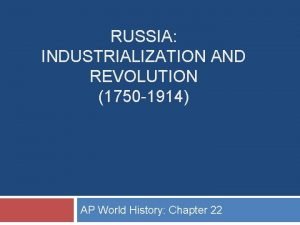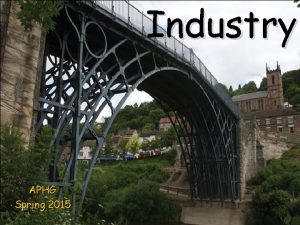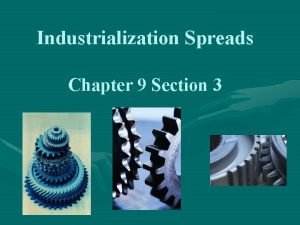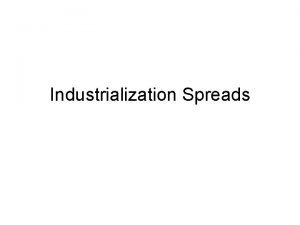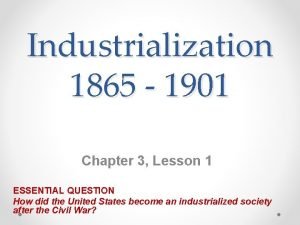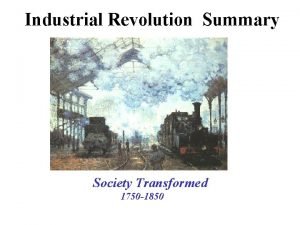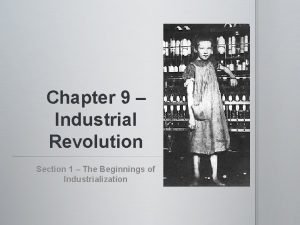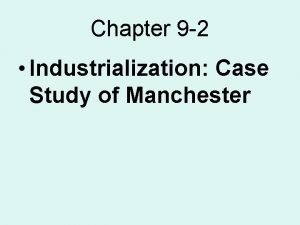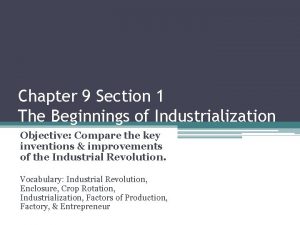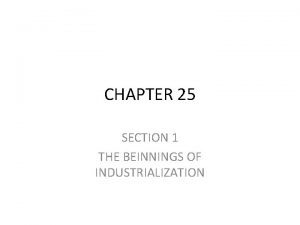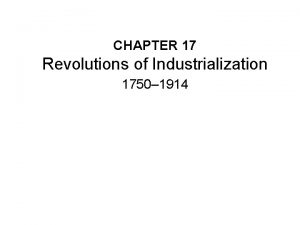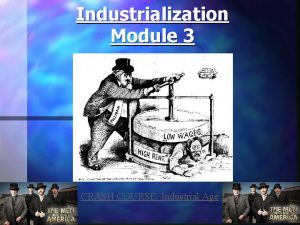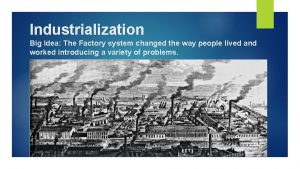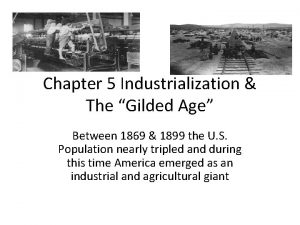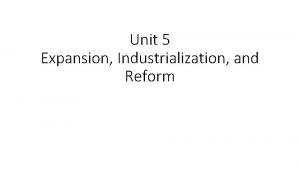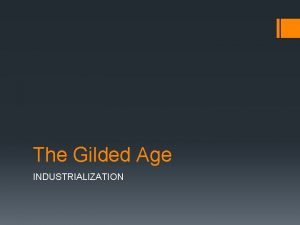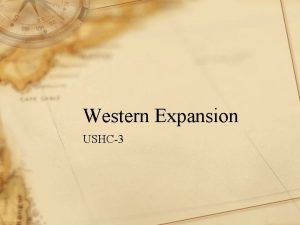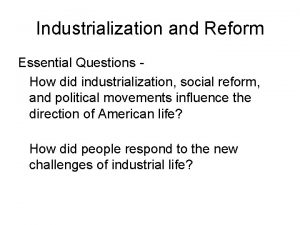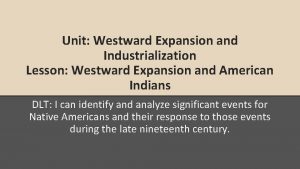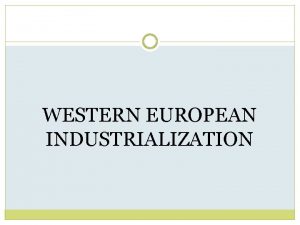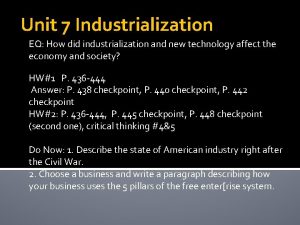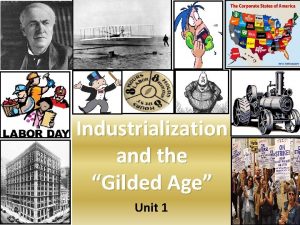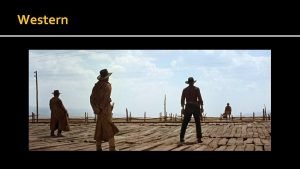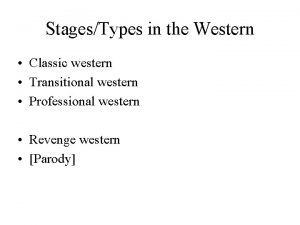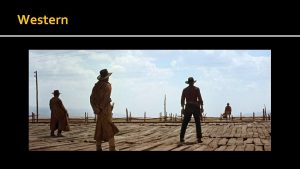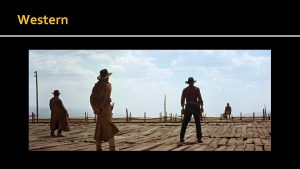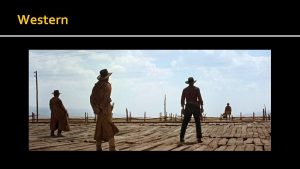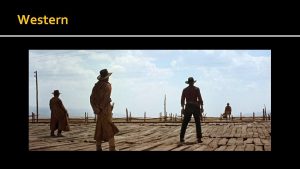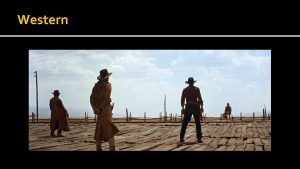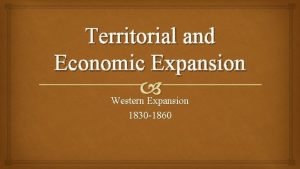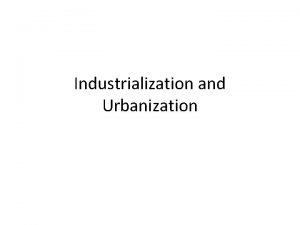Unit 5 Expansion Industrialization and Reform Western Expansion

















































- Slides: 49

Unit 5 Expansion, Industrialization, and Reform

Western Expansion Railroads • The Union Pacific (an eastern rail company and the Central Pacific (a rail company from Sacramento California) joined to make the transcontinental railroad

Western Expansion Railroads • The railroads allowed farmers and ranchers to ship their products to eastern cities, connecting the nation’s most profitable markets • Railroads also contributed to western growth allowing for easier migration

Western Expansion Impact on Native Americans • The Plains Indians depended on the Buffalo for their livelihood • Many Native Americans were forced to relocate to reservations

Important Battles Between US Troops and Native Americans • Native Americans chose to resist white settlement • The Cheyenne were forced to give up claims to land promised to them by the US government • US forces killed 270 Cheyenne at Sand Creek (most were women and children)

Important Battles Between US Troops and Native Americans • Red Cloud and Crazy Horse defeated General Custer’s forces at the Battle of the Little Big Horn

Important Battles Between US Troops and Native Americans • The last notable armed conflict between US troops and native Americans occurred in 1890 at Wounded Knee • The Sioux believed the Ghost Dance would bring back the buffalo

The Dawes Act • In 1887, Congress passed the Dawes Act which abolished tribal organizations and divided up reservations for the purpose of allotting land to individual Native American families • It was a huge failure

The Rise of Big Business • Thomas Edison’s light bulb enabled factory work to continue after sunset • George Westinghouse developed an alternating current system and when it was combined with an alternating current motor allowed companies to build factories wherever they wanted

Mass Production • The process of producing goods in large numbers • Selling more means the customer pays less • Industrialization made mass production possible • Henry Ford used the assembly line to cut costs • Natural resources (coal, iron ore, limber) must be available

Giants of Early US Industrialization The Railroad Industry • Took off after the Civil • Robber barons (wealthy War entrepreneurs who were known to be crooked in • The US government their dealings financed the construction of railroads • Cornelius Vanderbilt with subsidy bonds (cash connected his New York payments or a tax railroad to Chicago reduction)

The Rise of Big Business Oil • John D. Rockefeller opened Standard Oil which was the nations first trust • A trust is a business arrangement under which a number of companies unite into one system • Trusts serve to destroy competition and create monopolies (a market with only one supplier of a product and no market competition

The Rise of Big Business Oil • Vertical integration is a business strategy in which one corporation owns not only the company that produces the finished product, but also the companies that provide the materials necessary for production

The Rise of Big Business Oil • The Bessemer process meant that manufacturers could make steel much cheaper and faster which led to greater expansion of railroads and buildings

The Rise of Big Business Steel • Andrew Carnegie used vertical integration • Carnegie was a great philanthropist who funded the “Gospel of Wealth”

Finance Capitalism • Finance capitalist were bankers who exerted economic influence through companies’ stocks and bonds • J. P. Morgan

Interlocking Directories and Tariffs • Interlocking directories • Business leaders also allowed directors of one received aid from the company to serve as government in the form directors for other of protective tariffs, companies also which taxed foreign imports and made it • This allowed them to control entire industries, easier for US businesses to sell their products at thereby increasing their higher prices economic gains and limiting competition

Social Darwinism and the Gilded Age • Social Darwinism was • The Gilded Age refers connected to the belief to a time in which it that life was a battle of appeared that a thin the fittest layer of prosperity was covering the poverty • This became the basis and corruption that of laissez-faire existed in much of capitalism society

Cultural, Economic, and Political Impact • Capitalism fueled industrial growth in the US • Capitalism is an economic system in which means of production are privately owned • This produces market competition which leads to lower prices

Standard of Living and International Markets • Industrialization increased production and new inventions meant that consumer goods were more affordable and available which led to a higher standard of living • International markets opened up as business leaders increased their profits

Democracy • Poorer citizens and immigrants gradually won greater say in their government • This increased the power of urban governments

Farmers and Populism • Overproduction caused prices to drop drastically • Farmers debt was increasing • Farmers wanted subsidies • Framers wanted the government to pay them money to cover their losses due to overproduction • Farmers promoted the circulation of more greenbacks (paper money) this would lead to inflation or higher prices

The Grange • The grange was a cooperative of local farmers who pooled their resources to purchase new machinery and supplies

Populism (the People’s Party) • Populism was a political movement that embraced what farmers wanted • It supported the circulation of greenbacks and increased government regulation of business (particularly railroads and warehouses)

The Election of 1896 • The depression of 1894 led to the argument concerning bimetallism which refers to the dollar backed by silver and more greenbacks • This would increase the money supply and raise prices on farm products • President Cleveland wanted a dollar backed by gold • William Jennings Bryan backed bimetallism and gave the “Cross of Gold” speech • Republican William Mc. Kinley won the election of 1896 and populism faded

Urbanization • Industrialization • As industry grew, the caused migration to need for labor the cities increased • Immigration increased • Increased immigration dramatically with most kept wages low coming from Europe and China

Ellis Island • Ellis Island was used to process new immigrants on the East Coast of the US • Immigration led to cultural pluralism (many different cultures within one society)

Problems and Concerns Caused by Immigration • Nativists are people who strongly oppose immigration • Nativists were suspicious of ethnic ghettos in inner cities (Polish/Italians) • Most US citizens were Protestants and many immigrants were Catholic which created conflict

Nativism and Restrictions on Immigration • Nativism led to the growth of antiimmigrant groups • The Chinese Exclusion Act of 1882 prohibited Chinese immigration until 1943

Living and Working Conditions • Whole families worked because wages were low • People worked 12 hour days, six days a week • Child labor was a common practice

Sweatshops • Sweatshops were makeshift factories set up by private contractors in small apartments or unused buildings • Relied on immigrant workers

Urban Slums and Tenements • Urban slums are poor, inner-city neighborhoods • Tenements are overcrowded apartments that house several families of immigrants or poor laborers

The New Urban Lifestyle and Entertainment • Transportation evolved as electric trolleys allowed people to live outside the inner city while still working and pursuing leisure activities within it

Leisure and Entertainment • Saloons were places for men to drink and socialize • Dance halls and cabarets were places for women to watch musical shows • Amusement parks and sporting events

Political Machines • The political machine was an unofficial entity meant to keep a certain party or group in power • Boss Tweed of Tammany Hall

The Rise of Labor Unions • The Knights of Labor formed in 1869 and hoped to organize all working men and women into a single union • They pursued social reforms such as equal pay for equal work, the eight hour workday and an end to child labor

American Federation of Labor (AFL) • Led by Samuel Gompers it focused on wages, working hours, and working conditions • The AFL used strikes (refusal of employees to work until employers meet certain demands)

American Federation of Labor (AFL) • The AFL used boycotts (refusal to buy or pay for certain products or services in the hopes of forcing producers to change their policies or actions)

American Federation of Labor (AFL) • The AFL pressed for closed shops (workplaces in which employers could hire only union members • Eugene Debs organized the American Railway Union in 1893 and the Pullman Strike of 1894

Employer Response to Unions • Employers hated unions • Scabs (replacement forcing employees to workers) were used to sign contracts which replace striking workers forbade workers from • Employers asked for joining unions injunctions or court • Blacklists and lockouts orders that forbade occurred strikes because they violated the law or threatened public interests

Strikes and Confrontations • The Great Strike • The Haymarket Riot showed employers turned public opinion that they could appeal against the unions as to the federal many in the nation government for help in began to identify dealing with striking strikes with anarchy workers and violence

Strikes and Confrontations • The Homestead Strike broke out at the Carnegie Steel plant • Strikers and the Pinkerton’s (a private police force) engaged in a shootout • The Union backed down • The Pullman Strike set precedence for factory owners appealing to the courts to end strikes

Social Reform • The Progressive movement was a time of political, social, and economic change in the US

The Muckrakers • Muckrakers were • Upton Sinclair wrote leading intellectuals and about the meat packing writers who exposed industry in The Jungle corruption in • Jane Addams opened government and big the Hull House which business offered assistance to immigrants and underprivileged citizens

Temperance • The temperance movement was designed to limit or eliminate alcohol • The Eighteenth Amendment (ratified in 1919) prohibited making, selling, or transporting alcoholic beverages in the US

Women’s Suffrage • The women’s suffrage movement started at the Seneca Falls Convention and was led by Susan B. Anthony and Elizabeth Cady Stanton

The Nineteenth Amendment • Carrie Chapman Catt and Alice Paul were instrumental in the ratification of the 19 th amendment (the right to vote for women)

Theodore Roosevelt • was a progressive who did not oppose big business but believed some regulations were necessary • He did not like trusts or monopolies • Roosevelt sued the Northern Securities Company • The Supreme Court ruled in Northern Securities v. US that the company violated federal law and therefore must be broken up

Woodrow Wilson • Opposed big business and • Wilson signed the Clayton big government Anti-trust Act which make strikes, peaceful picketing, • Supported the Federal and boycotts legal Reserve Act which oversees banking • The 16 th Amendment gave Congress the power to collect • This gave the federal taxes on the incomes of government greater control businesses and individuals over the circulation of money and help prevent bank • The 17 th Amendment failures established the direct election of US senators
 Lesson 1 slavery and western expansion
Lesson 1 slavery and western expansion Unit 3 rev. statehood and westward expansion
Unit 3 rev. statehood and westward expansion Chapter 23 industrialization and nationalism
Chapter 23 industrialization and nationalism Guided reading activity industrialization and nationalism
Guided reading activity industrialization and nationalism Chapter 10 industrialization and nationalism
Chapter 10 industrialization and nationalism Industrialization and nationalism lesson 4
Industrialization and nationalism lesson 4 Under imperialism the stronger nation attempts to
Under imperialism the stronger nation attempts to Industrial revolution social darwinism
Industrial revolution social darwinism Unit 6 review questions
Unit 6 review questions Chapter 10 section 1 democratic reform and activism
Chapter 10 section 1 democratic reform and activism Chapter 10 section 1 democratic reform and activism
Chapter 10 section 1 democratic reform and activism Chapter 23 lesson 3 nationalism unification and reform
Chapter 23 lesson 3 nationalism unification and reform The ferment of reform and culture
The ferment of reform and culture Revolution brings reform and terror
Revolution brings reform and terror Taxation and budget reform commission
Taxation and budget reform commission Examples of relief recovery and reform
Examples of relief recovery and reform Chapter 19 political reform and the progressive era
Chapter 19 political reform and the progressive era The ferment of reform and culture
The ferment of reform and culture What was reform darwinism?
What was reform darwinism? Chapter 7 section 2 revolution brings reform and terror
Chapter 7 section 2 revolution brings reform and terror Chapter 15 the ferment of reform and culture
Chapter 15 the ferment of reform and culture W.w. norton
W.w. norton Chapter 23 section 2 revolution brings reform and terror
Chapter 23 section 2 revolution brings reform and terror The ferment of reform and culture
The ferment of reform and culture American reform movements between 1820 and 1860
American reform movements between 1820 and 1860 Church reform and the crusades
Church reform and the crusades Chapter 14 section 1 church reform and the crusades
Chapter 14 section 1 church reform and the crusades Homeland security
Homeland security Unit 2 westward expansion vocabulary
Unit 2 westward expansion vocabulary Thermostatic expansion valves respond to changes in
Thermostatic expansion valves respond to changes in Import substitution industrialization
Import substitution industrialization Industrialization causes
Industrialization causes Industrialization definition ap world history
Industrialization definition ap world history Primary secondary tertiary aphg
Primary secondary tertiary aphg Chapter 9 section 3 industrialization spreads answer key
Chapter 9 section 3 industrialization spreads answer key Chapter 9 section 3 industrialization spreads answer key
Chapter 9 section 3 industrialization spreads answer key Chapter 9 section 3 industrialization spreads answer key
Chapter 9 section 3 industrialization spreads answer key Deglomeration definition
Deglomeration definition Lesson 1 the rise of industry
Lesson 1 the rise of industry Result of industrialization
Result of industrialization Immigration essential questions
Immigration essential questions Power loom industrial revolution
Power loom industrial revolution Industrialization case study manchester
Industrialization case study manchester The beginnings of industrialization
The beginnings of industrialization Chapter 9 section 1 the beginnings of industrialization
Chapter 9 section 1 the beginnings of industrialization The beginnings of industrialization chapter 25 section 1
The beginnings of industrialization chapter 25 section 1 Chapter 17 revolutions of industrialization
Chapter 17 revolutions of industrialization Industrialization crash course
Industrialization crash course William cooper child labor
William cooper child labor Lesson 5 - industrialization
Lesson 5 - industrialization
